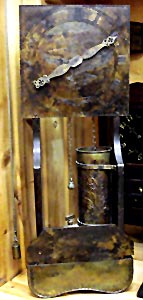Clepsydra is a water-clock as described in given in a note to the Vishnu Purana.
 Clepsydra is an ancient device for measuring time by the gradual flow of water. In one form of it, Clepsydra consists of a small boat or floating vessel that shipped water through a hole until it sank.
Clepsydra is an ancient device for measuring time by the gradual flow of water. In one form of it, Clepsydra consists of a small boat or floating vessel that shipped water through a hole until it sank.
In another form, the vessel was filled with water that was allowed to escape through a hole and the time was read from graduated lines on the interior measuring the level of the remaining water.
Clepsydra might have been invented by the Chaldeans of ancient Babylonia. The Romans invented a clepsydra consisting of a cylinder into which water dripped from a reservoir; a float provided readings against a scale on the cylinder wall.
Clepsydras were used for many purposes, including timing the speeches of orators as late as the 16th century. Galileo is said to have used a mercury clepsydra to time his experimental falling bodies.
This article is a stub. You can enrich by adding more information to it. Send your Write Up to content@indianetzone.com



















